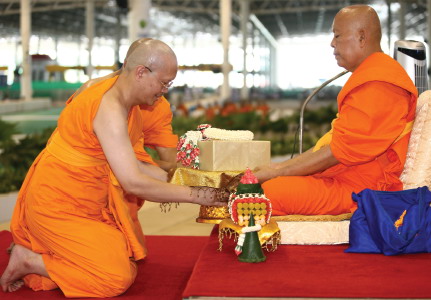สารบัญ
6. Caring for Your Preceptor

Your preceptor is one whom you owe much. Your preceptor spends countless hours instructing you on the ways of the Dhamma tirelessly. You should express your gratitude by respecting him, helping him in all areas possible, including his personal matters. Those who have had a preceptor before will know that in return for all this care, we will derive great benefits.
The Benefits of Caring for Your Preceptors
1. Instills a sense of humility, especially for those who may have come from a family of high social/economic standing. Your arrogance will subside. A parable on humility tells how a ripe head of rice, bends low under its weight. The head of rice that stands tall and proud possesses only a miserable harvest. Those who have a sense of humility are willing to open their minds to all of their preceptor's teachings. Such self-effacing modesty is a quality
much admired everywhere. The preceptor will see this and feel will-ing to pass on all of his knowledge.
The most important things being to have an open mind. Those who are arrogant will not be in a position to receive proper teaching."
2. Facilitates understanding & learning: Your closeness to your preceptor will help to facilitate understanding and allow you to learn more effectively from him. Learning that is more effective will ensure that your knowledge increases and that you have a better understanding of your lessons.
For example, when I first went to Wat Paknam, my first preceptor was Khun Yay Upasika Candra Khonnokyoong. She had a spittoon into which she would drop little pieces of torn paper. When ever she washed her hands into the spittoon, she would put a torn piece of paper on top of the wet tissues. I asked her why she did that, she replied that she was an old woman now, and she needed to rely on youngsters to care for her. she felt sorry for those who had to clean up after her, so she wanted to do her best to make the job less unappealing. The paper floated on top of the spittoon, so that people would not have to see the dirty tissues below. Dhammaprasit House was a large building housing many people, but having only one bathroom, whenever Khun Yay used the bathroom, she would leave the floor completely dry. Again, I asked her why she did that. She replied that many old people hurt themselves by slipping on wet bathroom floors, she did not want to be one of those people, "If the floor is dry" she said, it can be assured that even if you live for a hundred years, you won't slip and fall in that bathroom. Sometimes the younger students would do something wrong, but Khun Yay would rarely scold them. She would say that she had already scolded them once or twice today, if they were scolded more, they would grow tired of this, and they will not remember why she scolded them in the first place, she always knew when, where, and how to talk to her students. She would often remark that once you pass the age 50, you had to watch what you say. Many people of advanced age think they already know everything, but if old people speak too often, then their grandchildren and young relatives will become annoyed by this, and perhaps even resentful and leave such old people alone. As you can see, being close to your ciders and preceptor will allow you to learn many beneficial lessons about life.




